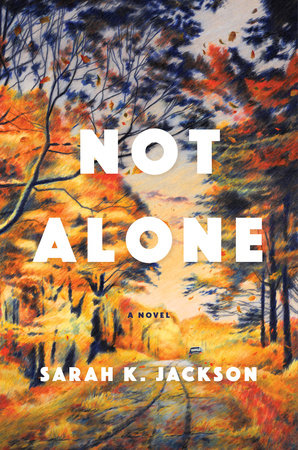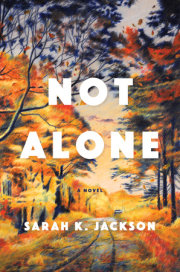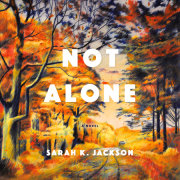1
“There’s nothing there, Harry.”
“You were staring. Your eyes are all big.”
“Sorry,” I say, whispering—to remind him to use quiet voices next to the open window. “It’s nothing you need to worry about, just grizzling up to rain I think.” I force myself to smile. Get a grip, Katie.
And still, I can’t help but glance outside. Eyes scanning the same flat hard ground that always looks up at me from four floors below, snaked with algae and moss. The same grey buildings that press in on us all around, with dappled ivy-strewn alleys running between them. Searching amongst the rowan trees and snowberry bushes, thick and wild along the crumbling walkways. Pausing over the leaves piled up where they’ve been blown. Everything is alive, pink-red, yellow and golden out there, fluttering in the pale orange light. A scattering of something that could just be fine, powdery grey snow, if I pretended, swirling across the open air.
Harry shrugs his delicate little shoulder and I realize I’m clutching it tightly, as if I only need to hang on to him to keep him safe forever. The kitchen-lounge comes back into focus. Together we lower the sloshing tin bucket to our feet. The cloudy water swirls with debris and the shield bug—iridescent-green shell that so mesmerizes me with its precious rare colour, red “socks” up to its ankles—still thrashes on the surface.
I catch Harry’s wrists before he scoops up the tiny creature. His face crumples, the bug’s six legs desperately flailing. “You know you mustn’t—we’ve been washing stuff that’s come from outside in there!”
Harry flinches, scrutinizing the almost-clear water fearfully. “There’s bad in it, Mummy?”
“Could be. You know this. We must always be careful . . .” I glance at the woodstove behind me.
“What if he’s breathed it or eaten it?” Harry says, a whine creeping into his voice, the shield bug buzzing at the sides of the bucket.
“Try this.” I grab the heatproof glove from beside the stove. Harry’s hand is swamped by the thick padded material, but he gently rescues the shield bug and we watch together as it wobbles out onto the railing with the disorientation and weak limbs of something too clogged with dust to live for much longer. Too sick from inflammation or the toxins leached or bloated by the foreign particles—the slow way. Or just plain suffocating—usually quicker. Yet creatures like this that can reproduce fast, before they succumb, seem more successful at surviving in the world After.
“I’m going to call him a green,” Harry whispers.
“A green?”
He nods, eyes bright. “’Cause he looks like emerald-dragon-green from the book. Emer because that’s a brand-new secret name and only we know it.”
“How do you know it’s a he?” I smile, thinking about Harry’s dragon book and feeling that tug towards make-believe.
Harry peers closer at the shield bug. “How do you tell?”
“Actually, I don’t know, usually male animals are prettier though, so they can attract females.”
“He is very pretty. Maybe that’s what dragons are, just lots of tiny pretty bugs all together. That would be cool! So dragons are not-real but kind of real in the end?”
“Yeah, it would,” I say, wondering when Harry became this sweet imaginative little person.
Emer opens his wings—a film of grey on the unevenly swollen and oozing lung-like vents underneath—and jumps out into the open air. Gone. One way or another.
“Was it the only friend?” Harry whispers gently, peering into the bucket, as if he might rupture tiny insect eardrums with his voice.
I try to return his grin, but the make-believe feeling is already seeping out fast. Harry hurries back towards the kitchen, skipping and bouncing off the arm of the sofa on his way, as I shut the window and smooth down the seals.
“Did you see, Mummy? I added these when you weren’t here.” He points at one of his artworks, stuck to the front of the defunct TV—some old hooped earrings of mine I loved wearing at uni and foreign coins have been added.
They make his collage of gleaming red and yellow leaves look like the insides of an expensive glossy watch—an artistic autumnal leaf print beneath tiny perfect cogs.
“Where did you find them?” But I know instantly. He’s been in drawers and cupboards I’d rather he left alone.
Harry looks away.
“I don’t want you going through that stuff, Harry.” But then I spot a pencilled motif repeated across several of the collages. “What are those overlapping circles supposed to be, rain?”
Harry shrugs, eyes avoiding mine. “Raindrops on raindrops.”
“You didn’t uncover the windows when it was raining, did you? Go right up to the glass to trace it?” I glance at the window—where there are the remains of vague smudgy circles where rainstorms have hit the other side of the glass.
“No, Mummy,” he says, his voice flat—hiding something—and throwing me a worried glance as he hurries to wait by the counter.
I clutch my forehead. Maybe it’s just been a long time since the Fear has settled inside me—that unbearable quality of fear, laced with dread and blind panic, that coloured most of that first year. Different to what I think of as healthy fear, with its surge of adrenaline and sharpness in a moment of trouble that feels better at helping me act. I’m not sure why it’s there today, heavy in my gut, putting me on edge.
Trying to focus on the task instead, I haul the bucket back to the kitchen area. The fruits are warm and sticky as I rinse them over the bucket, pouring clean—filtered and boiled—water from my flask over and tilting the sieve to carefully inspect the delicate skins for grey residue. The blackberry harvest is late this year. And these, the first, early fruits—bitter-berries, Harry calls them—are always tart and sharp, almost inedible, and Harry winces with each mouthful. Yet he stuffs them down. One after another as I pick out clean ones for him.
I think back to the first few weeks, when I still had chocolates and cake and actual sugar in the flat—boxes of supplies stashed in the kitchen from the panic-spree in the last winter Before—and I would go from periods of barely eating to periods of stuffing down mouthful after mouthful, even though I wasn’t hungry, even though it didn’t make me feel better, because it tasted good for just a second and it was filling me up.
I squeeze his shoulder again. “Sure you’ve not had enough?”
He doesn’t answer, instead swallowing down more berries without appearing to chew at all.
“OK, let’s save the rest for tomorrow.” I shut the lid on the still-dirty ones.
“Mummy, I want them.” He looks so desperately sad for a moment that I nearly give in. And besides, we need to eat plenty; everything, I have long suspected, is less nutritious than it once was. Yet he looks flushed, his eyes a bit wild, and he’s eaten nearly a bowlful.
“Remember how you were really sick last year because you ate too many damsons and redcurrants? Doesn’t it feel full?” I kneel to rub his tummy, putting my ear to it. “Oh my, Mr. Tummy is complaining.”
Harry’s beautiful little face breaks into a grin and a grimace at the same time.
There’s just enough filtered water left in the glass barrel on the kitchen counter for dinner tonight. I tip the dirty bucket into the top, where it trickles slowly down through the layers of magnetized gauze and charcoal and drips clear into the bottom.
“Come on, I should have got properly washed straight away.” I suddenly feel sick by having broken that rule—and risked contaminating Harry’s airspace—no matter how calm and safe it seemed Outside, no matter that my overalls and boots were left out on the landing outside the front door, no matter how upset and desperate for berries Harry was, no matter how guilty at his waiting tearful face I felt.
I tread softly on bare feet along the hallway towards the bedroom, relieved when Harry follows quietly this time. Please, no tantrums, not tonight.
Outside, the wind is now a constant rustling in the tall poplars beyond the blocks of flats opposite, but our flat feels still and stuffy—it always does in the summer, even at the tail end of it. My T-shirt and shorts cling to me, clammy and uncomfortable from wearing my outer gear over them, and I yank them off, draping them over the chair by the window.
Harry—eager to copy—struggles to get his T-shirt off. “Mummy! Alistair’s got me stuck!” He jigs on the spot, increasingly frantic, as I pull it up his small frame and over his head. I grin, tickling him as he reappears, and Harry dashes to the chair to turn his T-shirt back the right way and lay it next to mine, lovingly stroking Alistair’s faded red dinosaur crest from his forehead to the tip of his tail. Harry’s naked chest is delicate, and he is small, his clothes sized for three-year-olds, not the nearly five that he is.
“Perhaps I should raid the shops again for something new for us—”
“I like Alistair,” Harry says.
“I like my stuff too.” Makes me feel like me, having things that are ours, that we wear over and over. It tethers us, this flat, and everything in it. Safe.
In the bathroom, I crouch in the bathtub and lather up the soap. This batch is heavy on the lavender, making the ash and animal fat a little less unpleasant. Harry insists on coming in too, shivering—goose-pimpled—close to me, watching as I cup cold water over myself from the bucket I filtered and boiled yesterday and grinning as I gasp. I wonder if this counts as cold-water therapy—there was a craze for that once. Before.
Harry makes wet handprints on the stone-effect tiles and marvels at the way the water drips down in little droplets, getting slowed by limescale and the criss-cross network of grouting.
I let down my hair and tease it loose, the mousy-blonde strands falling to my shoulders. The water shivers through my scalp.
“Do me.” Harry bounces on his toes, knees knocked inwards, arms scrunched to his chest.
“Tip your head back.”
He blinks as the water dribbles through his hair, eyes clear and healthy, unlike mine, which sting from the rinsing. He giggles: such a soft, beautiful sound.
We splash the remaining water over each other, chuckling, until the bucket is two-thirds empty and I upturn it over the both of us—another shock of cold as it runs down my back. Harry squeals—the sound echoing off the tiles—then clamps his hands over his mouth. Both of us fall silent.
“Sorry,” he whispers between his fingers, eyes going from shining bright to watery and worried. He stands there rigid and dripping.
“It’s OK,” I whisper back, leaving him wrapped in a towel in the tub as I walk down the hallway towards the front door, still drying myself, my wet feet slopping across the thick muffling rugs. Harry’s delicate scuffs soon trail after me. I pull on the Yale lock, just twice, and try to take a few slow, deep breaths.
“I’m sorry, Mummy.”
“It’s alright.” I try that smile again, for Harry, hoping that despite my face feeling weary and the muscles twitching out of place, it might be comforting.
In the bedroom, I rummage for fresh clothes, my heart still pounding. My eyes are drawn to the top of the chest of drawers. To the last photo I took of Jack. His face smiles and squints out at me—the camera lens flooded with the kind of bright daylight that I can only half-remember now. I can bear just this one thing, this one reminder, the rest is tucked, safe, in drawers and cupboards. My fingers graze the bottom dresser drawer where the most unbearable things are hidden from constant view, all the painful pictures, diaries and keepsakes I have secretly pored over like carefully catalogued treasures so many times when the urge comes over me.
“Mummy?” Harry’s looking at me, beautiful rich amber-brown eyes frowning, that thick chestnut hair unruly and in need of a cut, just like Jack’s intense gaze and beachy mop in that photo. His still-wet fingers trace the edges of the seed packets in the basket by the door, his face falling further into bottom-lip worry as he catches me looking at them. And yet it reminds me that I must harvest the beetroots and carrots from my little polytunnels tomorrow, start sowing the spring cabbages and onions in trays in the stairwell—my seedstock is thin these days. It’s late summer now, and winter is coming. It always feels like winter is coming.
“Saying hi to Daddy?” Harry whispers, joining me on the edge of the bed.
My eyes flick once more to the photo but slide straight off Jack’s face, unable to stay looking at those sparkling eyes that don’t know what lies ahead, that remind me how utterly alone I’ve been now for five years.
Awful possibilities fill my head, as they often do when I look at his photo, imagining exactly how he died and where . . . It matters, not quite knowing—it eats at me. But I shove on a fresh shirt and shorts and leap off the bed.
“You’re it!” I race up the hallway, Harry right behind me, and he tags me before I reach the other end.
“Now you.” He grins, hurrying to the kitchen doorway, so we can start over and race towards the front door, the sound of our feet muted by the thick hallway rugs. Harry smothers his squeals this time with both hands.
Up and down we go, until I’m a heap on the floor, my chest suddenly tight and wheezy. But I’m smiling and pretending that it’s all OK and Harry has me beat fairly and squarely.
“I win today, same as yesterday!” he sighs, happy and curling towards me, his breath gone sour from the blackberries.
My eyes close, I’m still trying to catch my breath. Worry flickers. This is the third time in as many days where I’ve struggled to breathe. I try to dismiss it. I was running. I’m tired.
Instead, I let a familiar yearning creep to the forefront of my mind before I can stop it, imagining we’ve just run to the door because Jack got home from work, pleased to see us, and us him. Imagine us all hugging on the threshold, my face pressed against Jack’s chest, his arms wrapped around me, his breath slightly foul from the coffees that got him through the afternoon slump, but I wouldn’t care. Even now I can remember how good he smelled post-shower in the morning, of cedarwood and sage. I imagine him scooping Harry up.
Copyright © 2023 by Sarah K. Jackson. All rights reserved. No part of this excerpt may be reproduced or reprinted without permission in writing from the publisher.






